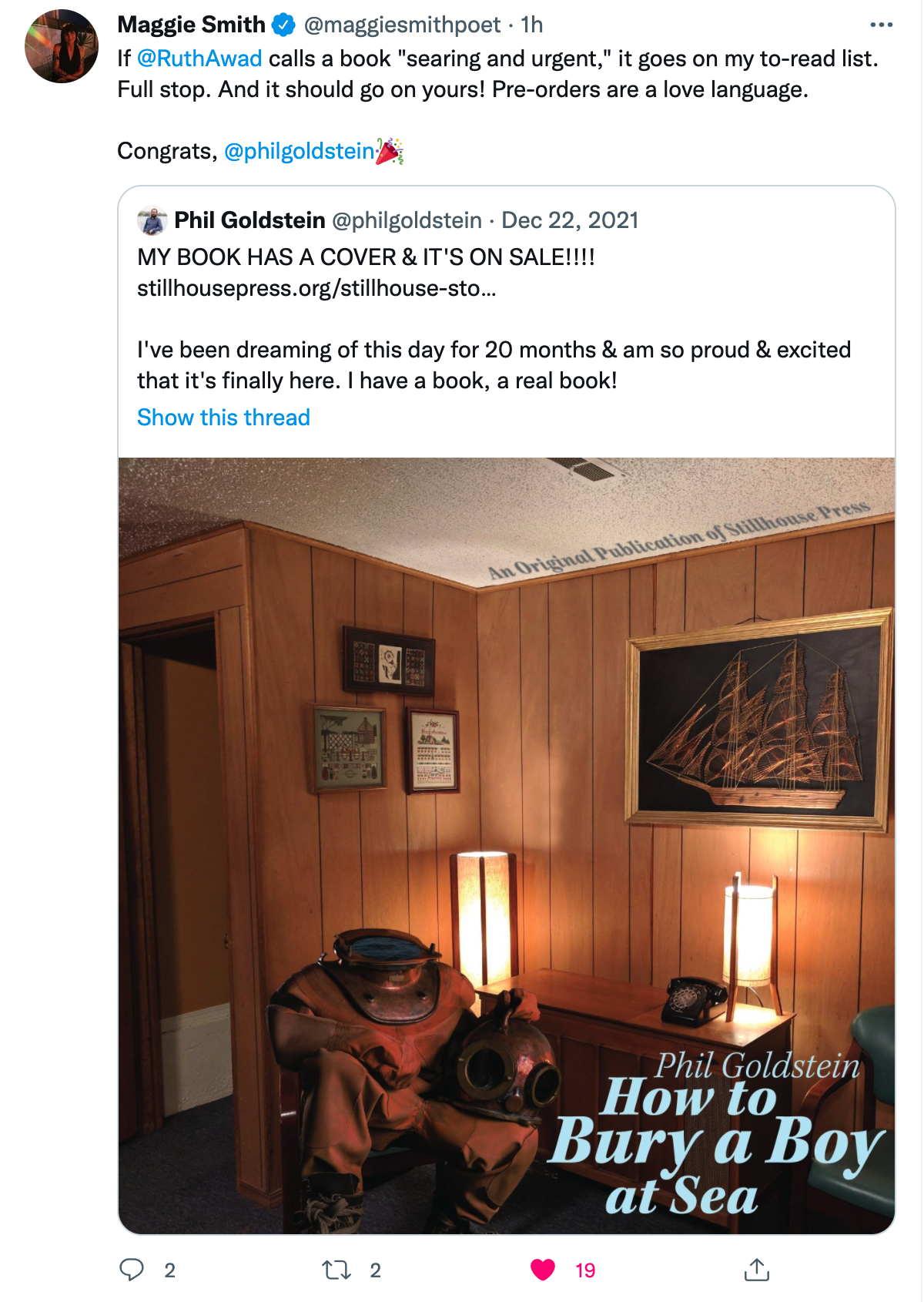How to Bury a Boy at Sea
Available from Stillhouse Press
In How to Bury a Boy at Sea, poet Phil Goldstein is the architect of his own unburdening, offering a rare and unflinching glimpse into the effects of child sexual abuse from the male perspective. Equal parts fury and calm, Goldstein’s poems contemplate family, faith, masculinity, and survival, delivering a powerful account of recovery through verse, from silence and shame to healing and rediscovered intimacy and agency.
Praise for How to Bury a Boy at Sea
“Goldstein concludes his book with the eponymous ‘How to Bury a Boy at Sea.’ Elegiac, yet sanguine, the poem ties together the currents which underwrite the collection, and in a moment of tender vulnerability, Goldstein lays to rest the boy inside of himself: ‘I kissed his forehead, then smoothed his hair & thanked him / for living long enough to see this day, for being / both a boy & something more, something sublime.’
This radical act of self-burial enables Goldstein to distill the tempestuous waters of his childhood into the balm which quiets his suffering, and in writing his recovery into existence, he creates a language for readers to do the same. As such, How to Bury a Boy at Sea is a cogent reminder that we, too, can heal.
I’m not sure if I believe in predestination, but I can say with certainty that Goldstein’s book found me when I needed it most. Although our lived experiences differ, I heard in his verse a cadence all too familiar, an echo of someone yearning to reconcile the pieces of themself once broken. I felt, in that strange, parasocial way, a sense of kinship with Goldstein, an understanding born out of intimacy and atrocity. I wept at the harrowing depths of his circumstances, and I delighted in witnessing his redemption. I took comfort in his unwavering honesty, and I found in his poetry a praxis for my own healing.”
—Seth Lewis, review in Barnstorm Journal
“Readers may find these emotional works about trauma and its aftermath to be difficult to read, but throughout this collection, the poet skillfully keeps the poems short, which makes them easier to process while also giving them a feeling of forward momentum. Often, at a poem’s conclusion, readers will have the feeling that an insight has prepared the speaker for a new phase of a healing journey; in short, the works very often give the reader hope of better things ahead for the speaker. By closing his collection with poems with phrases such as, ‘We are the testaments to the fact that gates can rust & not break. / …. / Hollowed-out hearts can be refilled, remade, renewed’ (‘We Are the Flowers in That Good Earth’) and ‘The wind blows & I am unafraid’ (‘The Aftertaste of the Wind’), Goldstein leaves readers on an optimistic note and with the feeling that daunting obstacles can be overcome. A harrowing and ultimately inspiring set of poems.”
—Kirkus Reviews
“In his searing and urgent debut How to Bury a Boy at Sea, Phil Goldstein charts trauma’s tendrils through time, memory, and place. In a collection that names the sexual abuse suffered at the hands of a trusted family member, it is apt that water is such a profound and recurring metaphor—what else could evoke how utterly adrift such a betrayal sends a child? What other than water is deep and deadly but necessary and life-giving? Such is the brutal complexity Goldstein navigates with unparalleled honesty and vulnerability as he shares his heartbreaking story and his journey toward healing and survival. As he writes, ‘But we are so much more than what we buried.’ A reminder every survivor needs to hear.”
—Ruth Awad, author of Set to Music a Wildfire
“To read this collection is to discover a beautiful voice, a generous and courageous voice that speaks to childhood sexual trauma, its aftermath, and the transcendent power of love to heal. Both expansive and intimate, it takes us to places of wonder and places of pain, from the forest to the synagogue, from the therapist’s office to the bedroom, from the bottom of the ocean to the shore. I celebrate Phil Goldstein and thank him for this gift.”
—José Antonio Rodríguez, author of This American Autopsy
“In Phil Goldstein’s revelatory and heartbreaking debut collection, How to Bury a Boy at Sea, the crux of the speaker’s childhood sexual trauma hurtles towards him, ‘churning’ and ‘swirling.’ With stunning lyric precision, Goldstein explicates an abuse cycle that said ‘yes with my silence / as it wordlessly welcomed in more.’ The pain of these memories, like ‘a liquid ocean swirling under a thick crust of ice,’ haunts the speaker and leaves an indelible impression on the reader. Goldstein painstakingly traces the ripple effects of trauma through a family and into adulthood. Through this process of ‘withstanding the waves & the woods, / the knife & the night, / the stillness of the void,’ Goldstein takes us on a harrowing but ultimately healing journey that speaks to the value of language itself to give voice to those who feel they have none.”
—Catherine Pond, author of Fieldglass
“Written to parents, to God, to the brother that molested his young body repeatedly, Phil Goldstein confesses violations few men are willing to confess. Guilt, anger, anxiety, and cultural expectations of manhood swirl in these pages, silencing its speaker into accepting poor apologies and excuses for injuries that haunt him well into adulthood, when his first public admittance of the abuse is referred to, by his father, as a ‘cowardly, selfish act.’ Poem by poem, we watch a boy reciting the Torah alongside his brother—his abuser—become a man, who must deliver the expected, jovial speech at this same brother’s wedding. Movement through is tense and pained as the speaker gives voice to his past to buoy his future. In How to Bury a Boy at Sea, Goldstein shares a rare glimpse into the effects of sexual assault on a man, in a culture with clear criteria for what it means to be ‘a man.’”
—Kimberly Ann Priest, author of Slaughter the One Bird
“In How to Bury a Boy at Sea, Phil Goldstein speaks against stigma to tell the story of a ‘haunted, hunted boy.’ Despite ‘chok[ing] back black tar,’ the speaker refuses to remain silent. These stunning poems remind us of the power of poetry to name even the most unspeakable traumas—the ‘invisible but grievous’ wounds of child sexual abuse. Goldstein fractures time and space as we witness the unraveling of the tenuous boundaries of masculinity, family, the body, and the self. This is a brave, lyrical debut collection.”
—Emily Mohn-Slate, author of The Falls
“Phil Goldstein’s How to Bury a Boy at Sea is a forthright and gutting debut collection about the ways in which childhood sexual abuse can come to frame a life. Early in the collection, Goldstein asks, ‘If I carry something with me wherever I go does it become / part of me?’ The book seeks to answer this question, moving us in and out of time to force us to see the monster, its brutality, and the ways in which these violent acts can break apart families, relationships, and our views of the world. Goldstein pleads, ‘Can you who are witness / to this eerie ceremony help me?’ asking us to see, as Adrienne Rich once said, ‘the thing itself and not the myth.’ What we find is not just damage, but a crawling out of the darkness, the breaking from beneath a wave.”
—Erin Elizabeth Smith, author of DOWN
“I began reading How to Bury a Boy at Sea with a sense of trepidation, given what I knew of its heavy subject matter. I was prepared, in other words, for a sobering read. But not one I could not put down. Not one whose seeking spirit ascends at times to moments of illumination both piercing and devastating in their beauty.”
—Ming Lauren Holden, author of Refuge
“I opened your book this morning, planning to read a few poems at a time. I am very, very far from a connoisseur of poetry. Four hours later, I read How to Bury a Boy at Sea and then closed the PDF file. Yours is a gentle, beautiful testimony. I have read countless accounts of survivors; I have listened to hundreds of testimonies. I have never witnessed anything like yours. Perhaps if I was more educated about the medium I could say more, be more eloquent. But all I can say at the moment is that I am deeply moved by your words and images; that your poems created a space in which I lived and breathed for four hours; and that I am very grateful for the experience.”
—Dr. David Lisak, clinical psychologist and vice-chairman of 1in6.org
For more information, please contact:
Alex Horn
Stillhouse Press Marketing & Media
publicity@stillhousepress.org
On Sept. 19, 2020, Stillhouse Press hosted a virtual poetry reading with three poets: Megan Merchant, Dean Smith and myself, in which I read four poems from “How to Bury a Boy at Sea” and answered questions from Tommy Sheffield, the poetry editor of Stillhouse Press.



